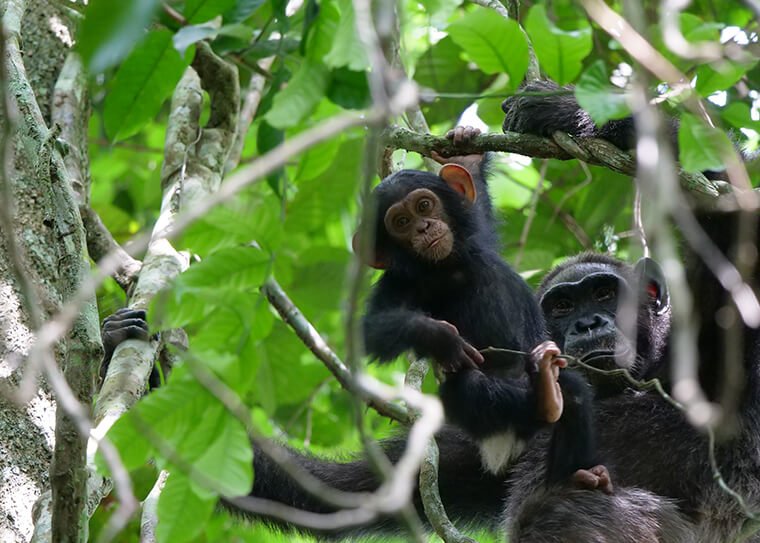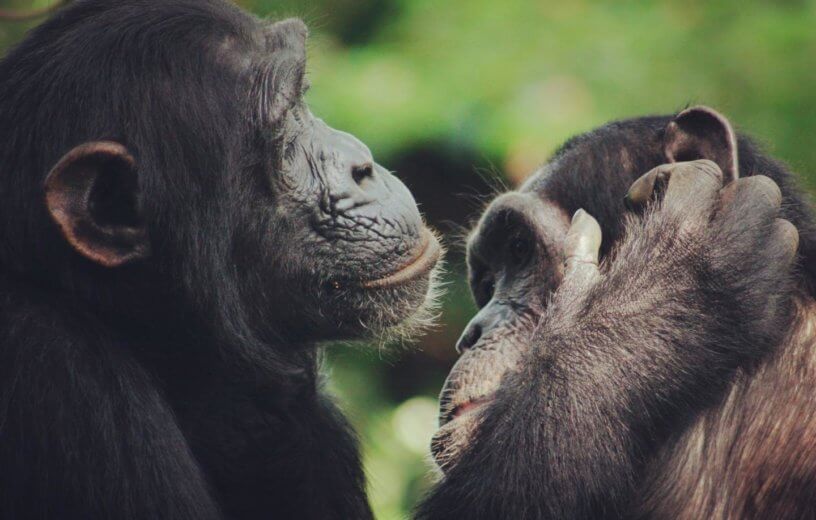LOS ANGELES — Chimpanzees also experience menopause, new research reveals, expanding our understanding of this biological phase beyond its previously observed occurrences in a select few mammalian species. Prior to this study, menopause had only been documented in certain toothed whales and humans.
The study focused on female chimpanzees residing in Ngogo, located within Uganda’s Kibale National Park. The findings showed a menopausal transition in these females akin to that experienced by human women. Fertility in the chimpanzees began to wane after the age of 30, with no births recorded beyond the age of 50.
Published in the journal Science, the researchers believe their findings can shed light on the reasons behind the occurrence of menopause and post-fertile survival in nature, as well as its evolutionary trajectory in humans.
“In societies around the world, women past their childbearing years play important roles, both economically and as wise advisors and caregivers,” says Brian Wood, UCLA associate professor of anthropology, in a university release. “How this life history evolved in humans is a fascinating yet challenging puzzle.”
“The (study) results show that under certain ecological conditions, menopause and post-fertile survival can emerge within a social system that’s quite unlike our own and includes no grandparental support,” Wood says, referring to the grandmother hypothesis, which suggests a role for post-reproductive women in supporting their grandchildren.
Interestingly, older female chimpanzees at Ngogo generally do not reside in close proximity to their daughters or take part in the care of their grandchildren. However, they often live beyond their childbearing years. Dr. Wood highlighted that, although long post-reproductive lifespans have not been widely observed in other field studies of wild chimpanzees, they have occasionally been noted in chimpanzees and other primates living in captivity, benefiting from excellent nutrition and healthcare.

The researchers propose two possible explanations for the observed post-reproductive lifespans of the female Ngogo chimpanzees. One possibility is that these lifespans represent a temporary adaptation to particularly favorable ecological conditions, as the group enjoys a stable and abundant food supply and faces minimal threats from predators. Alternatively, they suggest that such lifespans might be a long-evolved trait intrinsic to chimpanzees, though it has remained unobserved in other chimpanzee populations due to recent negative human impacts.
Professor Kevin Langergraber of Arizona State University, with over two decades of research on the Ngogo chimpanzees, noted their vulnerability to diseases transmitted from humans, emphasizing the significance of minimizing these risks.
“Chimpanzees are extremely susceptible to dying from diseases that originate in humans and to which they have little natural immunity,” Langergraber says. “Chimpanzee researchers, including us at Ngogo, have learned over the years how devastating these disease outbreaks can be to chimpanzee populations, and how to reduce their chances of happening.”
The study analyzed fertility and mortality data of 185 female chimpanzees collected between 1995 and 2016, calculating the proportion of adult life spent in a post-reproductive state. Additionally, the team measured hormone levels in urine samples from 66 females, between 14 and 67 years-old. This extensive research required countless hours of fieldwork at Ngogo for data collection and sample acquisition.
“This study is the result of an extraordinary amount of effort,” notes Jacob Negrey from the University of Arizona. “It’s only because our team has spent decades monitoring these chimpanzees that we can be confident some females live long after they’ve stopped reproducing. We also spent thousands of hours in the forest to collect urine samples from these chimpanzees with which to study hormonal signals of menopause.”
The researchers assessed hormone levels indicative of human menopause, including elevated levels of follicle-stimulating hormone and luteinizing hormone, alongside decreased levels of ovarian steroid hormones such as estrogens and progestins.
The study unveiled a menopausal transition in the Ngogo female chimpanzees akin to that of humans, occurring around age 50 and often extending life beyond this age. A female reaching adulthood at age 14 would spend roughly a fifth of her adult life post-reproductive — about half the duration typical of a human hunter-gatherer.
“We now know that menopause and post-fertile survival arise across a broader range of species and socio-ecological conditions than formerly appreciated, providing a solid basis for considering the roles that improved diets and lowered risks of predation would have played in human life history evolution,” Wood adds.
The researchers say that it will also be critical to track the behavior of older chimpanzees and observe how they interact with and influence other group members.
“To allow such work, it is essential to support the long-term study of primates in the wild,” Wood concludes.
You might also be interested in:
- Scientists find first evidence that chimps, gorillas build long-lasting friendships
- Chimpanzees learn to communicate just like human babies, study explains
- Vegan diet proves just as effective against menopause hot flashes as hormone therapy
South West News Service Stephen Beech contributed to this report.


I didn’t read the article; the headline set me off. Who is paying for this knowledge and who needs this knowledge? Is this knowledge going to help chimpanzees have a better life? Will knowing that chimpanzees go through menopause be a reason to beging HRT in chimpanzees? This all sounds like bureaucrats spending other people’s money at a bad time for the economy.